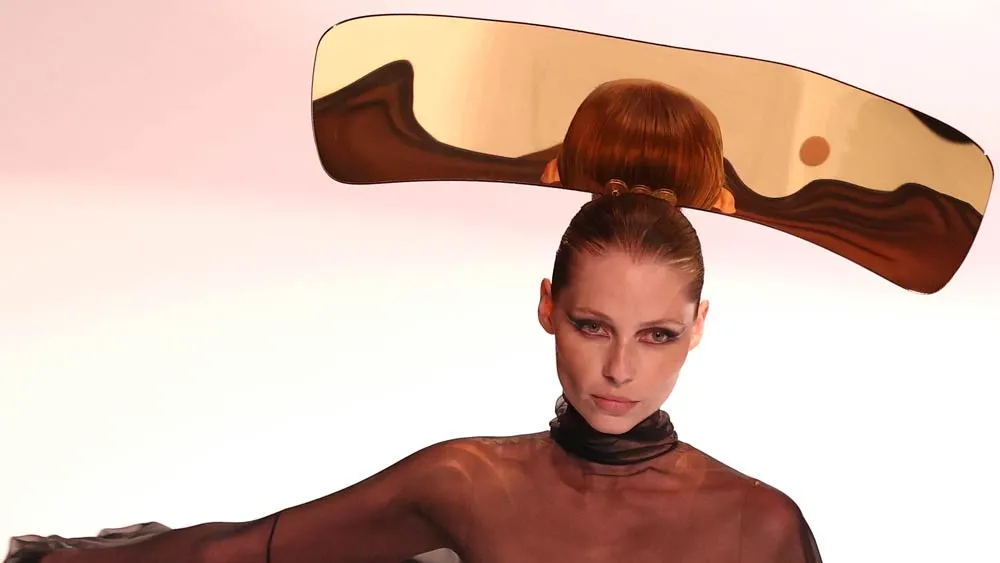March 3, 2022
Review: 'Picard' Roars Back with Fun, Fast-Paced Second Season
Kilian Melloy READ TIME: 4 MIN.
"Star Trek: Picard" jumps into its sophomore season as an action-packed fireball: Energetic, complex, and considerably faster-moving that it was in its first season, the show has its phasers set to thrill. The new season is possessed of a full-tilt momentum that feels like there's no time to waste.
And it's true: There really is no time to waste, given the problem that Admiral Picard (Patrick Stewart) and his new crew have to unravel. It's been a year or so since the events of the first season, and the admiral, refreshed by his adventures (and a new android body), has come out of retirement to head Starfleet Academy.
Swiftly and effectively, the new season gathers everybody up and gets them on board Stargazer, a powerful new ship that Cristobal Rios – also having returned to the Starfleet fold – now commands. Stargazer encounters a space-time aperture through which unknown entities are broadcasting a distress call and asking for Picard by name. The admiral has barely arrived on the scene before the show re-introduces not one, but two classic adversaries from "The Next Generation," and, if you've seen any of the previews you know that one of them is the omnipotent trickster known as Q (John de Lancie).
It's been decades, but Q's modus operandi hasn't changed: He still has a thing about challenging Picard, presenting the admiral with puzzles to solve. This time, it's both personal – Picard seems to have committed some transgression in the past for which Q requires a penance – and universal: Q has changed history, transforming the Federation into a galaxy-conquering police state that's based on the idea of human supremacy and dedicated to enslaving or extinguishing all other forms of intelligent life. In short, these guys make the baddies from the Mirror Universe look like Boy Scouts –�and the thing is, this twisted, sadistic future isn't some parallel reality, but the result of a single change to history and the choices human civilization has made in its wake.
But Q hasn't stranded Picard in this hellish reality by himself. The others are there as well –�everyone from Picard's Romulan protege Elnor (Evan Evagora) to Captain Rios (Santiago Cabrera), Dr. Jurati (Alison Pill), Seven of Nine (Jeri Ryan), and Raffi (Michelle Hurd). Like Admiral Picard – make that General Picard – they have their places in this version of the future, some of them quite distinguished. (You wonder what atrocities they committed to earn such lofty places in the hierarchy of this totalitarian regime.)
"Time has been broken," as one major player in the drama puts it, and there's only one thing to be done: Set course for the past – the year 2024, to be exact, just ahead of where Q will introduce that critical alteration... and where a mysterious "watcher" holds the key to restoring the future. To get there, Picard will need to forge an alliance with a relentless adversary; to succeed, he will need to keep his companions on task, even though the extremity of events, and the consequences of Picard's command decisions, cause some of them to question his leadership.
The plot is classic "Star Trek," and the sociological commentary is obvious to the point of bluntness. But you forget all of that, given that the narrative so complex, yet authoritatively drawn, and the characters are so strongly written. There's a trifecta of romances that are nascent, troubled, or finished; Jurati and Rios have called it quits, while Raffi, also newly returned to Starfleet, and Seven of Nine (Jeri Ryan), dedicated to the Fenris Rangers, are in a no-woman's-land situation, each of them focused on her duties and unsure how to make a relationship work across the light years. Picard, for his part, has a flirtation early on with his newly-widowed Romulan housekeeper, Laris (Orla Brady) –�a flirtation that goes nowhere, but that does spark some regret. (Laris' comment on the situation is both sensible and funny: "I'm too old for awkward.") The energy between the various couples drives much of the season's humor, counterbalancing the familiar "fish out of water" aspect of seeing our heroes displaced from their ideal future and dropped into our own baffled, uncertain times.
The series boasts cinematic production values that also bolster the season. "Picard" could go head to head with any of the franchise's movies and best most of them in terms of production design and visual effects, as well as less obvious arenas such as music and editing.
Based on the three episodes made available for review, "Star Trek: Picard" may have launched from a place of well-worn tropes, but its pace, energy, and willingness to go big are taking the series where no... well, you know the rest. So far, it's a white-knuckle ride and there's no telling what the show's writers have in mind for us next.
"Star Trek: Picard" premieres its second season at Paramount+ on March 3.
Kilian Melloy serves as EDGE Media Network's Associate Arts Editor and Staff Contributor. His professional memberships include the National Lesbian & Gay Journalists Association, the Boston Online Film Critics Association, The Gay and Lesbian Entertainment Critics Association, and the Boston Theater Critics Association's Elliot Norton Awards Committee.


